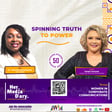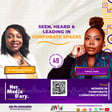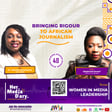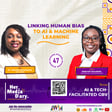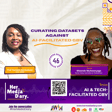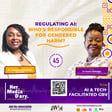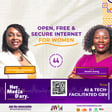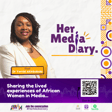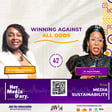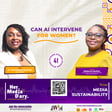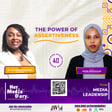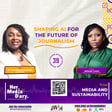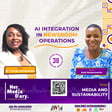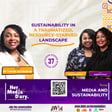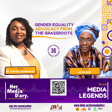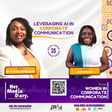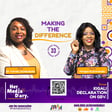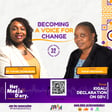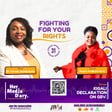Introduction to Her Media Diary
00:00:09
Speaker
Welcome to Her Media Diary, the podcast where African women share their real stories, bold moves, and behind-the-scenes moments that shift their journeys. I'm your host, Dr. Yemesi Akimobola, and with each episode, we're pulling back the curtain on what it really means to build a media career, break barriers,
00:00:25
Speaker
and stay true to your voice. Whether you're just starting out or already making waves, this space is for you.
Nima Aya: Data Science and Storytelling
00:00:32
Speaker
In this episode, I'm joined by Nima Aya, a civic technologist, artist, and founder of Policy, a feminist collective in Uganda that's reimagining how African women experience technology.
00:00:44
Speaker
Nima's work blends data science with storytelling, games, and designs. All to make sure our digital spaces are not only smart, but just and inclusive.
Why Aren't Digital Tools Built for African Women?
00:00:55
Speaker
From digital safety to Afrofeminist data futures, she's pushing back against extractive tech systems and asking the world, what if digital tools were built by and for African women from the start?
00:01:09
Speaker
Stay with us. All
00:01:13
Speaker
right, Nima, thank you so much for joining me on the podcast. Welcome to Her Media Diary. Thank you for having me.
Nima's Early Tech Journey
00:01:20
Speaker
You've lived across several countries, Nigeria, Tanzania, you were in the US for your degrees, and Uganda, and you're currently in Australia. so your And your work sits across tech, storytelling, and feminism.
00:01:35
Speaker
But let's start from the beginning. What was young Nima like? where Were you but you're always drawn to questions around justice and systems and tech? Thanks for that question. I wouldn't say so. I wouldn't say that I was initially join drawn to justice and systems.
00:01:52
Speaker
I definitely it was very curious. my My father was quite interested in technology, so he would often get pretty new devices. And I remember when I was... oh and my brother was very into video games. And so my parents also encouraged him to, you know, explore different devices.
00:02:10
Speaker
And so as a young child, I grew up around a lot of technology, but at the same time, I... I think I, as a girl, was not encouraged to seek out technology or to use technology.
00:02:23
Speaker
When I was young, I was always encouraged to become a doctor, to become a pediatrician.
Artistic Interests vs. Conventional Expectations
00:02:29
Speaker
You know, I remember people saying things like, oh, you're so caring with your dolls. You would make a great doctor. You would make a great pediatrician.
00:02:37
Speaker
It was never, oh, you're so curious. You're always, you know, you're playing on the computer that you would become a software engineer or you would be into computers. So it's interesting that even, even though your parents have your best interest, they still steer you in different directions based on gender.
00:02:52
Speaker
And that was definitely something visible when I was growing up, but, um, I was just a very creative child. was very drawn to art. And again, that's something that was discouraged. So my parents would say things like, oh, you can have art as a hobby, but you know, you've got to have a real job.
00:03:08
Speaker
And I think this will, this will come into our conversation later, but I would definitely say I was much more creative in art. And if I had grown up in a different environment, I think I would have steered more towards the art
Academic Shift: Health to Civic Tech
00:03:20
Speaker
But I think that carries on into my life, even now at the moment that I'm still very curious. I still like exploring a lot of different facets. um Yeah, I think,
00:03:32
Speaker
That carries through in my life. Do you do much arts now? I do tons of arts. So if you look at any of the work at Policy, most of the art is done by me.
00:03:43
Speaker
If you look at art games, all that art's done by me. um i do i do art for podcasts. I do arts for reports. i and find doing art to be ah very calming experience when I do digital art.
00:03:57
Speaker
I also do physical art. I do paintings. You can maybe see an easel right there in the background. Yes, yes. I didn't notice that. Which is asked the question. didn't want to ask you, but yes, I could see that.
00:04:10
Speaker
you studied, now you've got to help me pronounce this word. Epidemiology. epidemia ah Epidemiology. So just just just for our misless, there's some words that
Centering African Women in Digital Transformation
00:04:20
Speaker
struggle to pronounce. like It took me a long time to be able to pronounce Mediterranean.
00:04:25
Speaker
Oh yeah. Like that takes a lot of effort. I don't know why, but it's just some words anyway. yeah So you studied that before building one of Africa's most creative civic tech labs.
00:04:37
Speaker
How did that shift happen from kind of going from public health now to public data? Yeah. So as I said, in my previous question, I was steered towards, you know, becoming a doctor.
00:04:49
Speaker
I did study pre-med and then at some point in my last year, I figured, i was like, you know, this is not for me. i think I was listening so much to the the voices that had been in my ear my whole life that, you know, finally in my early twenty s I was like, I don't think this is actually my dream.
00:05:08
Speaker
I think this is someone else's dream. And but then I was so deep in it and I was like, how do I get out? And so I liked the idea of public health, you know, that you would be able to be creative in your approaches to improving the health of large groups of people.
00:05:25
Speaker
And so I studied epidemiology in my master's, and and that's basically, it's the statistics of health. So, you know, during COVID, suddenly everyone became like an armchair epidemiologist, right, trying to predict how many people have the disease, you know? yeah And that's really, i think that's really why I could see what I studied really shine through.
00:05:47
Speaker
um So technically it's not a big shift. I was already interested in working on data. And so it was just a matter of dropping the health part of things and working more broadly on data.
00:06:00
Speaker
I actually ended up working Um, at the time, you know, SMS projects were, were rising in popularity and then they were also like simple. So basically using simple phones for creative approaches to different sectors like health. Like one example is there was like a mama project in Tanzania where you text women messages throughout their pregnancy so that they're aware of what's happening in their bodies. I mean, i mean now you know that the apps, right? Your baby is the size of a raspberry or a melon or.
00:06:29
Speaker
And it was basically taking that and making it simplified so that, you know, women with simple phones also had access to that. um So that's where I made the jump to tech and health.
00:06:42
Speaker
And then eventually I saw that there was a very big gap in how we, how within the African continent, we were not making the best use of data. I felt that that was a very big gap and I felt that I already had the data skills and that,
00:06:58
Speaker
it would be interesting to find creative ways to work with civil society and governments on on using public data,
Joining Feminist Internet Research
00:07:05
Speaker
basically. And that's sort of how policy as an organization happened.
00:07:11
Speaker
So was there moment or situation that made you realize that we need to center African women in digital transformation, and not after it happens, but while it's Yeah, there is actually a moment, but it wasn't at the start. So I don't want to say that policy was started with that in mind, because that's not really true.
00:07:31
Speaker
um There was a moment where I realized, okay, we need to do some digital transformation that, you know, is is effective. Because um the story that I tell is that my mom, after several years, decided to transfer the house she had gifted to her mother into her name when my grandmother passed away.
00:07:48
Speaker
And she took a long time, you know, to do it. she i think it was over 10 years and she was like, okay, it's finally time. And just dealing with, you know, the the housing office to just change her name from um one person. um Of course, it's a it's an important procedure that has to happen, but it lasted like two years and it was very frustrating.
00:08:07
Speaker
where she would have to go like every two weeks and like look for someone and the person wasn't there. The person was on leave. The person was, it's just these issues. And I was like, okay, there's definitely a better way to do these things, but it's the same way with so many processes when you're going to get your passport, when you're going to renew your driver's license.
00:08:24
Speaker
And, and this is, you know, several years ago as well, things have definitely improved. And that was really where I was like, okay, we've, I was really inspired that, you know, there are ways we can digitize in a way that really works for people.
00:08:37
Speaker
And, but where I really started to focus on on women specifically was when I got the chance to be part of a feminist internet research network. It's a research network that, you know, really brought me into this idea of the feminist internet.
00:08:52
Speaker
And that was around 2019. And since then, you know, it really, i think, you know, I've always been a feminist, but I've never I never used the vocabulary. I never had that sort of feminist instruction, yeah you know, in some ways, but I obviously lived and breathed it and, you know, through my whole life.
00:09:13
Speaker
And so it just made sense. It clicked, you know, that this is what I want to do. I want to center. women's voices and how technology is happening. Also, again, because I still think there is a very big gap in in that sector.
Inclusive Communication in Feminist Spaces
00:09:27
Speaker
Yeah, absolutely. And it's really interesting what you said about kind of one day realizing that actually, oh, I'm a feminist so or i'm I'm actually living and breathing this term. yeah But there's a lot of people who kind of have a very difficult relationship with that word. But but it's it's so true because I think I also had that moment and where I had that realization actually everything that i really deeply care about was around women's rights and gender equality and essentially feminist principles, right?
00:09:57
Speaker
What does that mean for you in the context of the work that you do? As in coming into realizing that my work has always been very grounded? Yeah. It's been interesting because I remember being at my first meeting and just feeling like there was a lot of jargon that felt a bit exclusionary.
00:10:18
Speaker
Like, because I had not studied that or I had not read about this language that we have, I did feel like a bit of an outsider. So it felt like, oh, but this is how I live, but I don't speak this language. It felt like that.
00:10:35
Speaker
um And so a lot of my work is really about trying not to use jargon that could make people feel excluded.
00:10:45
Speaker
I think I try to bring that into all my work and that's why I always try to use creative approaches. So art, drawings, murals, poetry, anything that makes people feel connected to an issue. I think that that's really important to me that we don't get stuck on words and language, but rather like how we feel.
00:11:05
Speaker
Yeah, no, absolutely. And even actually when you look at a lot of feminist scholarship discourse, there's that kind of occupation with the term and the word. And actually, kind of feel we we need to move beyond that.
00:11:16
Speaker
and But also kind of thinking about you know, what you said about people feeling excluded, like you feel excluded, even though your work is definitely within the space.
00:11:28
Speaker
Yeah, you know, it could be that there's some grandmother in the village who, you know, has been educating girls all her life and she's done all these amazing feminist things, but then she doesn't speak that specific language, right? But that doesn't make her any less feminist.
00:11:43
Speaker
Yeah, yeah, absolutely. And you founded Policy as a Civic Tech
Creative Approaches in Policy vs. NGOs
00:11:48
Speaker
Collective. and But it doesn't look or sound or feel like that traditional kind of tech NGO. and It's playful. Like you said, it's creative. All your arts and stuff is feminist.
00:11:58
Speaker
So what did you want to do differently? Yeah, I feel like sometimes the NGO space can be so stuffy. You know, there has been a way that things have been done and there are a lot of people who want to keep the status quo.
00:12:15
Speaker
you know, whether these organizations are effective or not, whether those methodologies are effective or not. And I don't think that always works. I think it works, you know, maybe, i mean, for some things like health, you know, like you want to be serious, you want to give a serious message. But I mean, you know, even living here in Australia, there's so much effort to make things relatable, you know, to make content available to everyone to um to reach whoever in whatever way. If you have to reach Gen Z, then you've got to tailor your content to Gen z you know And I think a lot of NGOs got stuck in some era.
00:12:55
Speaker
And there's like a lot of respectability politics. I mean, there's a lot of issues generally within the NGO sector. I think as someone in there, I can also say looking in that there are things that need to be fixed.
00:13:07
Speaker
And yeah, I think that's really why. Things that need to be fixed. once um I would say just like what we're spending money on, for example, or how we conduct meetings.
00:13:18
Speaker
Like, you know, is it as effective to hold a big conference in a big hotel? ah you know, we've had participants who have told us like they don't want to attend certain meetings because they don't feel like it's their space.
00:13:34
Speaker
They've never been to a big hotel like that. They don't think, you know, that they would that they would be welcome there, for example. So, for example, we have an annual event called Data Fest.
00:13:47
Speaker
And we really try to do these events at universities or So this year we're doing it together with the Ministry of ICT at their hub. So they've made like a really nice hub.
00:13:58
Speaker
in Uganda where everyone's welcome and they can use computers and, and even that can be, you know, people can even then feel, Oh, I can't go to a ministry hub, you know? So it's, how do we reach the people we want to where they will actually feel comfortable? I think for me, I think a lot of my colleagues will know that I really try to stay away from like doing things in hotels, just, you know, feeling like you can't be creative in those spaces, even that,
00:14:27
Speaker
You don't have privacy, just the way things are done. um so those are some of the things, just what are we doing that isn't effective, that isn't inclusionary?
Inclusivity in Conferences for Women
00:14:38
Speaker
Yeah, just rethinking those.
00:14:40
Speaker
Yeah, I mean, this this era, this time with, you know, the cuts and things like USAID and all of those things are perhaps periods for that introspection, right? For change. Because apart from the things that you said already, there's also that concentration of focus on certain organizations who are like, you know, you you you go to some of these events and it's the same voices, the same people, the same line line up of speakers yeah who are deemed the experts. And actually, um you know, we do our annual conference as well. And we're very, very deliberate in not being about that, you know, anybody.
00:15:17
Speaker
anybody and everybody kind of is very welcome to be on our... app So you'd see that we don't have like a celebrity status panel or a massive keynote with some big names as usual suspects.
00:15:29
Speaker
um And I think... So I definitely agree with you. And one of the things that we've... had to contend with over the years was people saying, well, you know, we need more men in this space. And a conference that started African women in media, obviously it's going to be predominantly women, right? But you do want more men. But actually in the early stages, it wasn't us stopping men from participating.
00:15:49
Speaker
It was men not participating, if that makes sense. You know, i remember there was one particular conference we had where we did have, I think we had about and well five male speakers,
00:16:01
Speaker
And on the day of the conference, not a single one of them showed up. And not a single one of them even said, we can't make it anymore. you know So it's it's one of those things, but I mean, it's definitely the pandemic really helped to address that. I think I remember we did a couple of years virtually, and it was almost getting to that kind of 60, 40, 50, 50 split actually.
00:16:25
Speaker
And now we don't really see that
Using Play in Digital Safety Education
00:16:27
Speaker
much of a problem. We still have let's say 70% women, and And that's fine because actually there are some spaces that you need to see more women because actually traditionally when you go to conferences or you go to certain spaces, there'll be no women there or there'll be very few women. yeah you know so So I definitely see kind of, like you said, this is a good era for that introspection in the NGO space.
00:16:50
Speaker
So one of your tools, so I love the title, Digital Safety, as in safe dash T-E-A, as in sit in the T, right?
00:17:01
Speaker
Okay. So Digital Safety, um it turns online safety into a choose your own adventure experience. Really fascinating. Why do you use paid play?
00:17:12
Speaker
and or Or rather, not why do you use play? I think it's more about what is the role of play and storytelling for you? What have you found that's worked for you in teaching about serious digital arms like online GPV? And this is an important question because actually I remember many years ago, was very interested in gamification and news media.
00:17:33
Speaker
And actually there was that conversation around, well, is that trivializing sometimes very serious stories? And that was kind of some of the questions that people were asking at that time.
00:17:45
Speaker
I don't believe it does. I believe actually gamification, that inclusion talked about, allow people to engage with really serious issues in a more inclusive way, in a way that maybe it makes it feel less of a barrier to engage in those topics. So what have you found? Why have you used play in storytelling on digital arms and technology versus gender-based violence? That's a great question. What have you found helped?
00:18:11
Speaker
Yeah. So actually I, I've taken this one step further. I'm actually doing my PhD now on play and learning. And it's basically that I feel that play is a very powerful tool and it's not a tool to be trivialized. And it's something that I'm looking into in terms of gender. So my PhD is looking at gender play learning in digital context. And as girls growing up, like even the physical space you are given to play is limited.
00:18:44
Speaker
You know, like i was not allowed to walk freely on the street when I was growing up. That was not something that was available to me. It was available to my brother. um The kinds of games you play, how you play, how you move your body even is so dictated by culture when you're a girl.
00:19:01
Speaker
And My question is like, how does that impact your whole worldview? In fact, how does that impact how you learn? If you cannot play and explore, i think you cannot learn because everything I have ever learned in my life has been through play and exploration.
00:19:20
Speaker
You know, i I'm not the kind of person who will watch a tutorial, you know, or sit through an online course. And I think I even like in university, I really struggled to like really, you know, pay attention for the whole semester.
00:19:33
Speaker
Because i really like to learn by doing. And i want to I want people to think about all those points and like how restrictive society is for girls and how does that impact their long-term learning and lifelong learning as well.
00:19:46
Speaker
And so yeah, I just think that you learn so much more by doing. You know, if you play a game, you are reading, you are active, you are constructing knowledge while you are in this activity compared to if I just sat you down in a room and I spoke at you.
00:20:03
Speaker
that's how a lot of teaching is done now, right? You're spoken at. And yeah, I think that this interactivity, I think it is the future of learning. And I think it is a very powerful tool, even ah probably especially if it is heavy topics, you know, like digital harm or whatever. it's There's so many examples of really beautiful games that teach very, very heavy topics.
00:20:27
Speaker
But let's let's go deeper into it. I'm really curious about, i mean, give us a very specific example of of you your organization using play to communic communicate or to engage people in with a very serious topic of play.
00:20:43
Speaker
technology facility to gender based violence. Right. So, yeah, I mean, this game is the example. So we use this game in our trainings basically. So we have trainings, you know, where we walk you through all the things like two factor authentication, you know, safe passwords. But the thing is how many people can you train? We're a small organization, you know, we're not, we're not a school.
00:21:04
Speaker
We're not a university. The need for digital safety trainings across Africa is, is tremendous. Think about how many people are becoming first time internet users today alone. And then think about how many people have become first time internet users in the past 10 years.
00:21:19
Speaker
There's no training. Like there's no curricula for how you train people to use the internet, right? So we're just unleashing all these people onto these online spaces with no training whatsoever.
00:21:30
Speaker
And there's no way that as a small civic society or organization that we can reach everyone. So it's really trying to see How can you, for the smallest amount of money, reach the most amount of people in an impactful way?
00:21:44
Speaker
So that's why we're trying to use these sort of
Balancing Accountability with Tech Platforms
00:21:47
Speaker
interactive tools. But to mainly answer your question, we we try to use it as much as possible in our trainings. We share it with our partners. They use it in their trainings.
00:21:55
Speaker
And it's an ongoing tool. you know We're trying to, because tech changes all the time, so trying to stay ahead of that and create new content for new types of games as well. so It's a few years old now, and it's definitely, I would say, in need of a refresher.
00:22:17
Speaker
Hey there, something really exciting is coming up. It's the African Women in Media 2025 conference. We are bringing together journalists, editors, media leaders, policymakers, academics, creative, the tech community, investors from like across the world convening on the 4th and 5th of December 2025 at the African Union Commission Building in Addis Ababa, Ethiopia. Under the theme of Beyond Commitments, advancing policies for gender-safe media, you'll expect to have powerful keynote sessions, hands-on workshops, exhibitions, important networking opportunities.
00:22:58
Speaker
And through the hour and picture on which we are reintroducing this year, You have the opportunity to meet with media development funds and pitch to them your media business ideas. Tickets are now on sale. It's a great time to secure your spot.
00:23:13
Speaker
To find out more, go to awim25.africanwomeninmedia.com. Join us at the African Union Commission in Addis Ababa, Ethiopia on the 4th and 5th of December for the African Women in Media 2025 conference. Don't want to miss
00:23:42
Speaker
Yeah, yeah. So you've worked with everybody from grassroots organizations to META's, being on META's safety board, which is Quite interesting. How do you balance that tension and between holding tech platforms accountable and working from within, you know, ah as well?
00:24:00
Speaker
Yeah, it is quite the tension. I mean, especially when you are a smaller organization, because on one hand you, you want the audience, right? You want to be able to talk to the platforms, but on the other side, you also want to share your grievances.
00:24:14
Speaker
And I think there is that worry, you know, like if I complain too much, then I won't have access to them anymore. And yeah, I think it's just about keeping that balance and knowing that even the people within these tech platforms in the African context, it they are responsible you know to the company that they work for, but at the same time, they have the interests of African people. So they are also, it's also knowing that they are conflicted and that we are conflicted and that we're just trying to do our best.
Designing AI for African Women’s Realities
00:24:43
Speaker
So, but but I mean, I don't know how much you can speak about being on Meta's safety board. What was that what that experience like? what What are the kind of challenges and opportunities that you you face being on that space?
00:24:57
Speaker
I can't say too much about it because a lot of it is under NDA, but I can say that it made me learn how complicated online safety is. like Yeah. it's more complicated than you could ever imagine. Like every little issue, you've got to look at it from all these different angles. And you know you keep trying to build more features until you have a platform that is so bloated. It has so many things because you're trying to protect for every single use case. And it's a very difficult job. And um I work with someone named Cindy and she's lovely and she's doing her best, but it is very tricky.
00:25:31
Speaker
Mm-hmm. And as someone who has worked on Afro-feminist data futures, what does it mean to design AI systems that reflect African women's realities rather than erasing them?
00:25:45
Speaker
Yeah, it's a trick that's a good question, but it's also very tricky. And it's obviously something that we talk about quite often at Policy. And it's this balance between hyper-visibility and invisibility.
00:25:58
Speaker
So in some ways, the data of African women is very limited. you know, to understand the lived experience of an African rural woman is so difficult. You don't have the data on that. And that's just it.
00:26:09
Speaker
And so in some ways they are invisible and their data is not being used in AI systems. And some people could say that's a good thing, you know, that their data is not being exploited. But on the other hand, again, it does mean you're invisible. So your data is not being used. You're not being represented.
00:26:24
Speaker
And whatever the AI spits out is not based on your lived reality.
Cultural Background and Migration Stories
00:26:30
Speaker
so you could ask okay does that mean we should collect more data from african women and i think people will defer on that i'm not going to give one answer or the other but i think my bigger worry is the flattening the flattening of who an african woman is and not just by like western companies but also by you know local ai companies where
00:26:55
Speaker
you know, people will say something like, oh, a Ugandan accent. And even then I'm like, okay, but there's so many Ugandan accents. There's so many languages spoken here. You cannot compress this country into into one thing. And so even with women, it's like you cannot compress the experiences of women into this single monolith.
00:27:14
Speaker
And I think that's really what I worry about is that that erasure there where you're not getting the full spectrum of the realities of women. Mm-hmm. I mean, even just speaking about your own lived experiences, Neema, because you were you born in Lagos and then moved to Tanzania and Uganda and the US? s Like you've been it lived in many. How has that shaped your identity and and your intersectionalities and who you see how you see yourself?
00:27:45
Speaker
Yeah, of course. So I never lived in Tanzania, but my mother is Tanzanian, so I am half Tanzanian. And I'm half Indian. And i grew up in Nigeria. i lived there until I was 18. And yeah, I never see my story reflected anywhere. You know, I feel...
00:28:02
Speaker
Like you hear so much the story about, you know, Africans who have migrated to the US or to London. Like there's so many novels written about this experience. But my question is, okay, but what about the experience of somebody who moved from Nigeria to Tanzania?
00:28:17
Speaker
Like, what's that story? And you don't get much of that. You don't get like, you know, even like my my family's history of how we migrated, you know, all over East Africa. There's so few stories that ah tell of this experience. In fact, there's nothing I can actually refer to on that on that specific story of of my own family.
00:28:37
Speaker
And yeah, I think there's so many, and that that does really shape my world in that knowing that there are so many stories that have to be told, that have not been told. And if we don't tell them, they will be lost to history for forever.
Advice for Young African Technologists
00:28:49
Speaker
And so it's it's sort of that erasure that I think that I really do worry about. It's interesting, yeah, that intra-Africa kind of migration. That's actually a project we've been working on and and with the support of GIZ for the last few months, where we are curating stories of women who are kind of doing intra-Africa migration, whether through trade or other things, and whether forced or otherwise also, but mostly in terms of free movements, because I know that there's a whole continental-wide, with the Africa, for example, continental-wide efforts to improve
00:29:25
Speaker
the ease of intra-Africa free movements. Obviously, there's still infrastructural issues, for example, around airlines. you know Visas, airlines, terrible visas allies trying travel within the continent. I remember i was just recently in Zambia. Obviously, I live in the UK, traveled to Zambia, and I arrived before my colleague who lives in Nigeria and traveled to Zambia because he had to take an airline that took him to the Middle East before coming back to the continent. right right so they're still, yeah. so but we we have been working on creating, we call that project is the Move Africa project, curating stories of intra-Africa movements. Yeah.
00:30:05
Speaker
So, but back to your work with ah kind of designers and developers, which you do a lot of work with, what would you say to young African technologists who want to build more ethical platforms, and but feel pressure to share,
00:30:19
Speaker
chase scale or global trends like you just said right there about flattening narratives also and it's almost again another rush to follow what's happening in the west as well yeah i i can't deny you know that we live within capitalist systems and that in today's world the the social currency or the currency of respect is money you know i think that that is unavoidable I think, you know, back in the, just to give an example of something I think about, you know, that back in the day, billionaires would build hospitals and they would, you know, they did a lot of like public good because that was something that was valued and treasured, you know, it was generosity, but no longer, I think now it's just how much can you hoard?
00:31:03
Speaker
You know, like we always are, this is the richest man and this is richest man does. And so I can see why young people feel very compelled to follow that path because that is how it is today.
00:31:14
Speaker
And yeah, I, I totally empathize because that's just what you, if you've always grown up seeing that it's difficult to know that there's another way to know that there's something that can be based on community or care or ethics. I know it can be very tricky.
00:31:29
Speaker
Um, but I think that there funders, there are communities who are interested in these sort of platforms. I know it's difficult to think about, okay, but what would the business model be? How would it be sustainable unless we make money, but sometimes it, you don't need to grow at all costs, right? It's, it's okay to build something and to maintain it and to live off of it.
00:31:50
Speaker
Or even like so many people build, you know, open source tools that, you know, we'll never make them money, but they know that it is for the greater good of the community and that it always leads to other opportunities. You know, i for young people, I always say, just build something, just have a portfolio, have something you can show.
00:32:06
Speaker
You don't need to make money with it because you have no idea what kinds of doors that will open for you. You know, what kinds of jobs, what kinds of opportunities, partnerships, friendships, relationships it can build for you, but always just build something with a good heart in mind. And I think it will take
Reimagining Social Media for African Women
00:32:24
Speaker
Absolutely. And if you were to reimagine how social media platforms or air tools were built, starting from a woman's experience in Kampala or Dar es Salaam, for example, what would be fundamentally different That's a very big question. I feel like if I knew the answer to that, I would have built it.
00:32:44
Speaker
Yeah. But it's true. Go back how many years, you know, to to even before Facebook, like imagine you were Zuckerberg in that room in Harvard building Facebook, but now thinking about, you know, the woman in Kampala, for example.
00:33:04
Speaker
I really did like the original Facebook though. I joined Facebook in 2005. And like, for what it was, i thought that was great. Like, I would love to bring that back. Like, it was such a simpler time. Like, I would love to just have a tool that just, you know, is photos and thoughts. you no yeah Yeah. And no ads in that.
00:33:22
Speaker
It's something, you know, that maybe if everyone actually, you know, paid a small amount to use the platform, like so that we don't have to see ads or if there was some other way to contribute, to become a member of the platform, like a bartering system.
00:33:38
Speaker
so that it's not a system based on like monetization of your eyeballs all the time. If it was just sharing your photos and your thoughts from people you know and people you love, I feel that was a good time and I would love to go back to that time.
Advice for African Women in AI
00:33:55
Speaker
But it's interesting to say that because I think monetization is monetization, right? So even if you were playing this, there were platforms back then that that was the model. And don't know.
00:34:06
Speaker
They don't exist anymore. You know, I remember there was a platform, there was a platform that raised a lot of money. can't remember what it was called. Um, but it was focused on, and you know, how we have content creators, right? Right. But it's like, okay, this is going be like like a channel, uh, like a YouTube platform where we have really good curated content creation.
00:34:29
Speaker
um and then you'd pay a subscription because you but you want to access really good quality content and it fell flat and a lot of people put a lot of money and fell flat but so i think there's still that tension of you know organizational survival and monetization is still monetization whichever i mean it's just like why would you pay if you can get it free right like it's Instagram is free so why would I think people wouldn't be very insensivized to move to a platform where they have to pay when the content is is also very high quality on yeah a free platform where you have to watch ads.
00:35:00
Speaker
I think if maybe, as you said, if we, if this was before platforms that had monetized, maybe, but now it would be very difficult. Once people get something for free, it's difficult to, to change.
00:35:13
Speaker
Well, and I guess, I guess also there's the, there's issue of the access, right? And the, how many people can afford to pay such fees as well, right? You know, and Facebook is popular in Africa.
00:35:27
Speaker
and more than other platforms because it's the and not just because of because of the access but also the ease of of kind communicating with your with your family and WhatsApp also is like the platform to communicate beyond phones you know for those reasons because of those eases of access so I think there's there's always like you said that tension between when when it comes to the issue of monetization and approaches So, but lastly, what advice would you give women in Africa who want to break barriers by venturing into machine learning and AI, but may not know where to begin? And I'm going to raise my hand and say, i' am one of those people who are like really, really enthusiastically trying to yeah learn everything I can about AI. And it's like, sometimes i just think, where am I starting from? Where do you start?
00:36:12
Speaker
Yeah. I think my advice is the same advice I mentioned a little while ago, but it's, You need to read and you need to, to try to do and okay.
00:36:22
Speaker
okay I think read, write and do that's my advice. So the first one you might say, okay, that's tricky because there's so much content on AI. Where would I even start? But there's a lot of good people, like good organizations that are doing a lot of significant work. So I would definitely say read as much as you can and form your own opinions on what you think it is. Like don't fall into the hole of thinking,
00:36:46
Speaker
about the risks or the biases or the harms of AI or that it's bad or whatever. um I think it's very interesting. So currently, i in the game development space right now in 2025, among game developers, there's a lot of pushback against the use of AI in making video games, which is very interesting because you know this sector feels that AI is going to take their jobs.
00:37:11
Speaker
And AI is going to take that as many, many, many, many jobs. and it's sort of a time to see, okay, but what are the new types of jobs that may be created? And and it's a very tricky time in human development because a lot of people are going to suffer from the lack of jobs because every day when I see what AI is capable of doing and like how much advance it gets every day, it is scary, but it's also fascinating. So I think it's very important for people to form their own opinions one way or the other.
00:37:38
Speaker
And then I think it's very important for people to write. I think that writing is such a good way to share your thinking and to make connections, to make networks, to to give different perspectives to this whole debate. And I'm really encouraging young people don't use AI to write articles you put on the internet. It's so much nicer to hear your voice and, you know,
00:38:05
Speaker
I think a lot of us use AI. I use AI every day. I use it for writing, for game dev, for whatever. I do my art. I do rely you know on on on AI for like poses and things like that.
00:38:16
Speaker
I use it in so many different ways. But I think what I never want to do is to lose my voice in AI because it's so easy to see. I can read i can look at any paragraph and I can tell you that AI wrote that.
00:38:29
Speaker
And if I look at that and I see someone's writing as AI, i immediately don't want to read it because why? Why would I do that? so It's really important, I think, for people to maintain their voice. So read, form your opinion, maintain your voice.
00:38:40
Speaker
And as much as you can, try to build some stuff. There's so many tools now. AI has made it so easy to make things. It would be really nice to see people across Africa build things that are useful. As we talked before, it doesn't always have to make money.
00:38:54
Speaker
Sometimes the joy of life is providing something good to the world. So as much as possible, look at tutorials and try to make something that can be useful to someone, because I think that will open so many doors for you.
00:39:05
Speaker
Absolutely. Thank you so much for joining me, Nima. It's been a pleasure.
00:39:22
Speaker
as a lived reality and about resisting the pressures to build for scale when what we really need is to build for justice. She made it clear that feminist leadership in tech isn't just about representation.
00:39:35
Speaker
It's about radically rethinking how systems are designed, who they serve and who they silence. So thank you for listening to her media diary. If you found today's conversation inspiring, don't forget to to subscribe, leave a review and share this episode of somebody who needs to hear it.
00:39:49
Speaker
If you'd like to join on an episode of the podcast, send me an email. at gmc at africanwomenamedia.com and visit our website hermediadiary.com to listen to all the other episodes of this podcast.
00:40:01
Speaker
Subscribe and follow Her Media Diary on your favorite podcasting platforms and stay tuned on our partner radio stations from across Africa. And don't forget, join the conversation using the hashtag Her Media Diary. Until next time, stay safe, stay curious and keep amplifying the stories that matter.

